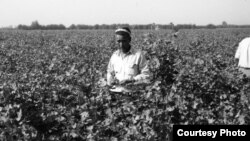“In Uzbekistan, cotton is commonly referred to as ‘white gold,’” says VOA Uzbek Service editor Navbahor Imamova, “it’s the country’s main product.” But little is known about the lives of the farmers who work the fields.
To help fill the information void, Imamova interviewed author Russell Zanca, professor of anthropology at Northeastern Illinois University in Chicago. Zanca spent time in rural Uzbekistan as part of his fieldwork, which he wrote about in the book, Life in a Muslim Uzbek Village: Cotton Farming After Communism.”
Editors at VOA’s sister station Radio Free Europe/Radio Liberty liked Imamova’s 25-minute interview so much they produced a web story, and the interview was also picked up by the popular regional news agency, Ferghana.ru, which linked to the video on its Russian-language website.
Imamova said the service received considerable feedback on the piece from its Uzbek audience, including e-mails and Facebook posts on the importance of covering human rights issues that may be overlooked in daily life.
“Sometimes we need to hear how bad things are at home from complete strangers,” wrote one viewer. “This interview you did in Washington with Professor Zanca -- so far away from home -- made me think of the most basic problems we have in Uzbekistan. We need to value and respect our farmers.”
Uzbekistan is the world’s fifth-largest producer and third-largest exporter of cotton in the world. Human rights groups have criticized the government for its production methods. Most of the product is picked manually.
To help fill the information void, Imamova interviewed author Russell Zanca, professor of anthropology at Northeastern Illinois University in Chicago. Zanca spent time in rural Uzbekistan as part of his fieldwork, which he wrote about in the book, Life in a Muslim Uzbek Village: Cotton Farming After Communism.”
Editors at VOA’s sister station Radio Free Europe/Radio Liberty liked Imamova’s 25-minute interview so much they produced a web story, and the interview was also picked up by the popular regional news agency, Ferghana.ru, which linked to the video on its Russian-language website.
Imamova said the service received considerable feedback on the piece from its Uzbek audience, including e-mails and Facebook posts on the importance of covering human rights issues that may be overlooked in daily life.
“Sometimes we need to hear how bad things are at home from complete strangers,” wrote one viewer. “This interview you did in Washington with Professor Zanca -- so far away from home -- made me think of the most basic problems we have in Uzbekistan. We need to value and respect our farmers.”
Uzbekistan is the world’s fifth-largest producer and third-largest exporter of cotton in the world. Human rights groups have criticized the government for its production methods. Most of the product is picked manually.





